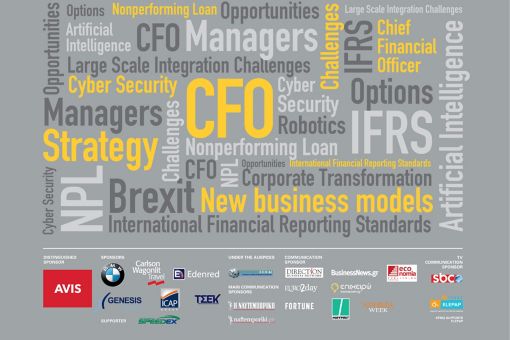The 16th CFO Forum, organized by KPMG, was successfully completed
15 Jun. 17, 9:00AM - 6:00PM, EET
James Bellini, Historian of the Future and author, former editor and presenter of the Financial Times Television, discussed the future changes that are expected to upset the balance and affect business. He stressed that ‘the future is now’ and gave current examples of practices that are expected to be adopted more extensively in the coming years due to technological developments and rapid climate change. James Bellini warned that the life expectancy of firms will drop considerably as their products and services will not be relevant to consumer needs, and suggested a creative rupture with the present and a groundbreaking relationship with the future. He referred extensively to Big Data, the ‘oil of the 20th century’ as he characterized it, which is leading the 4th Industrial Revolution and will be the foundation of the economy for the next 20-30 years.
Luis António, Partner at KPMG Portugal, highlighted the automation of business processes in general, and financial management in particular, stressing that this is a one-way street. Research has shown that by 2020, digital work will be a market worth $152 billion. Robotics Process Automation (RPA) will be incorporated by companies for repetitive tasks, saving a lot of time and allowing executives to concentrate on more strategic matters. These tasks will be error-free and in most cases will require human engagement mainly for approval issues. A recent KPMG study shows that 70% of financial managers estimate that technology is the factor that will affect their work the most in the coming years, but only half of them think that they are making effective steps in this direction.
Peter Zinn, cyber security expert and founder of Cyber Agents Company, spoke about the great danger brought by the new technological revolution, which is none other than cyber attacks. He analysed various instances of potential attacks that can take place against businesses, in different industries, and asked companies to proceed with introducing at least a basic level of protection, given that - as he emphasised - no one can be 100% safe and all systems are ‘vulnerable’ to risks.
In view of the significant accounting changes to IFRS from 2018 onwards, Markus Kreher, Global Service Line Leader for Accounting Advisory Services for Consumer Markets at KPMG, discussed the challenges and opportunities that will arise for companies due to this development, focusing in particular on IFRS 15 that affects revenue accounting. He noted that the proper preparation of financial directorates is the first, essential step to avoid a crisis. He also advised chief financial officers to involve the other executives in this accounting transition, so that all the necessary processes get to run smoothly. Among the opportunities, he mentioned the possibility of renegotiating contracts as well as revising costing.
The topic of the intervention by Giannis Kalafatas, General Manager of Financial Services at Mytilineos Group, was corporate transformation and the challenges for large-scale projects. Mr. Kalafatas clarified that ‘transformation can be a merger or a spin-off or an entry into new markets and areas of activity. In any case, transformation is necessary for the survival of an organization’. As he underlined, ‘the course of the transformation of the company depends on the management’s insight, the timeframe, and the degree of adaptability of the company’.
Next, Peter Spiegel, the well-known Financial Times news editor, offered a general overview of the European economy and European business. He placed particular emphasis on the theme of work, noting that we are living in a period of ‘youth explosion’. Young people realize that they do not have an ‘easy’ future and good prospects, as OECD studies show that jobs are being eliminated, thereby leading to the exclusion of a large proportion of employees from the professional arena. Peter Spiegel underlined the need to complete the single market in Europe in order to make the continent more competitive. He compared the EU with the US economy, where the business environment is more favorable and flexible and, thus, businesses can grow quickly.
The event ended with a panel discussion on the issue of non-performing loans, coordinated by Thanos Tsotsoros, General Manager, Deal Advisory, Head of Corporate Finance and Restructuring at KPMG, with Vassilis Theofanopoulos, Partner at Pillarstone, Alexandros Metallinos, Partner at Karatzas and Associates, and Serafim Sotiriadis, Lawyer at Serafim Sotiriadis and Associates, as speakers. The discussion led to the conclusion that while
non-performing business loans are a thorny issue for the Greek economy, they can at the same time be an important opportunity for strategic investment as well as for the concentration and strengthening of certain sectors.
Click here to download the available presentations.
Contacts

Connect with us
- Find office locations kpmg.findOfficeLocations
- kpmg.emailUs
- Social media @ KPMG kpmg.socialMedia